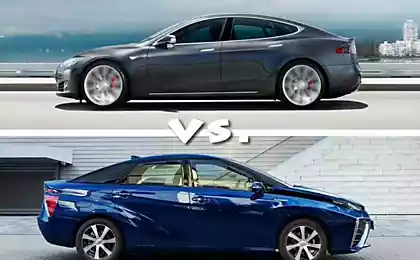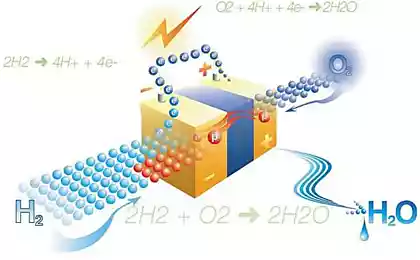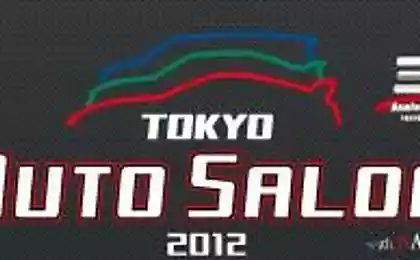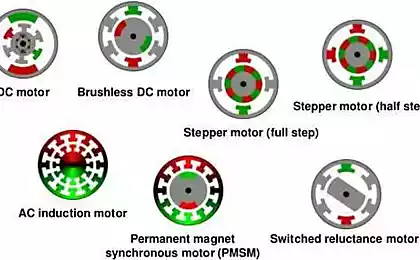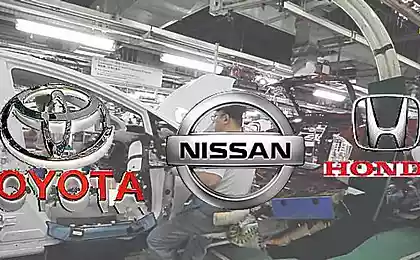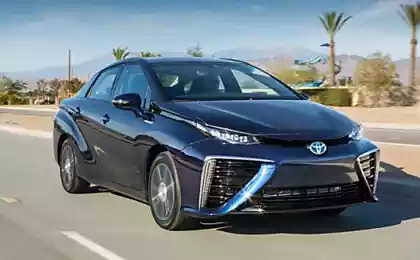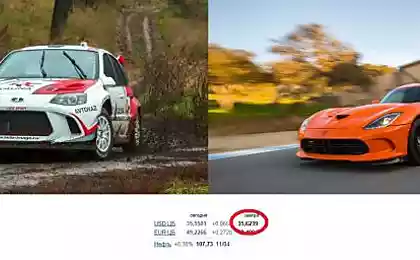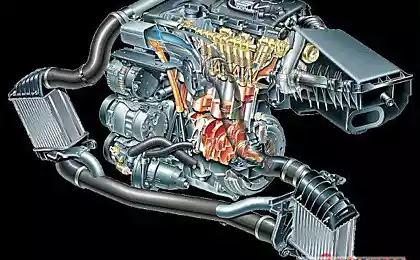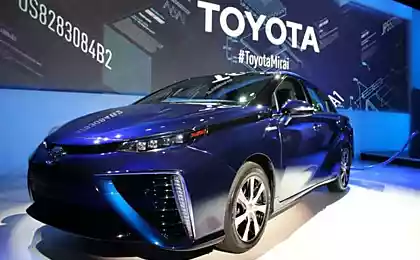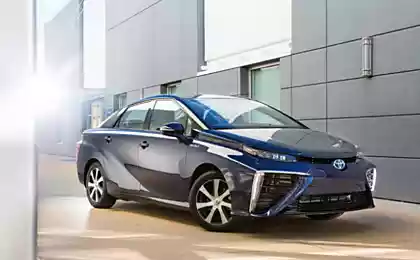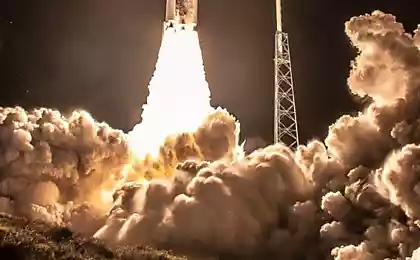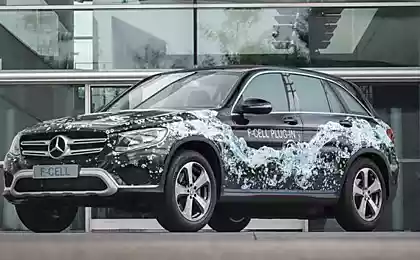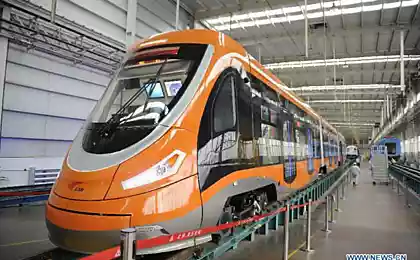563
Toyota launched the world's first car with a hydrogen engine
In Japan are full selling the world's first production car with a hydrogen engine — sedan Mirai ("Future") produced by Toyota Motor Corp.
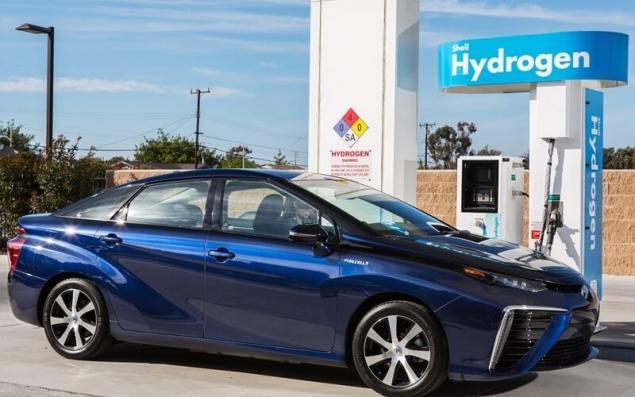
Due to the large interest in the new model in Japan, the number of pre-orders for Mirai has already exceeded the sales plan in the country. Until the end of last year the Japanese automaker had planned to produce 700 cars on fuel cells, in which electricity for the engine is produced by the combination of hydrogen from the tank with atmospheric oxygen. 400 of them should go to the domestic market, 200 in the US and 100 in Western Europe. In this regard, Toyota announced that until the end of 2016, is investing ¥20 billion (about $162 million) in the development of production cars with hydrogen engines, increasing production of the sedan Mirai threefold (2.1 thousand per year).
Part of the investment will focus on expanding export these machines in countries of Western Europe and the United States. They, according to Toyota, should be the main external market of hydrogen cars. By the end of 2017, the automaker intends to supply the United States for more than 3 thousand of sedan Mirai.
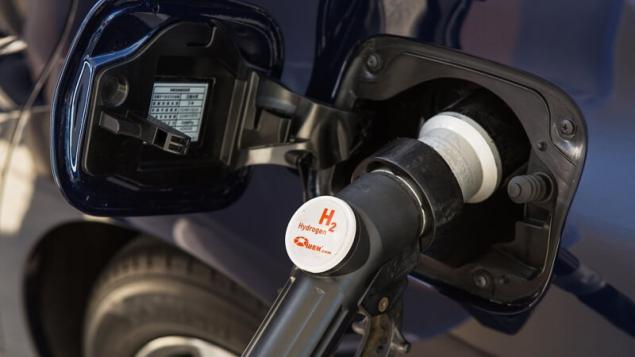
A significant increase in the production cars on hydrogen (up to 50 thousand per year) will be reached in 2020, when Tokyo will host the summer Olympic games. They, according to local authorities, should be a big step towards increased use of hydrogen not only in the automotive industry, but also in energy. And in 2030, every tenth sold in Japan the car will be a fuel cell that, according to the forecast of consulting company Deloitte Tohmatsu Consulting Co., bring the Japanese economy additional ¥4.4 trillion in profits (about us $36,9 billion).
The cost of the new sedan Mirai in Japan is ¥of 7.23 million ($60,7 million), while the government provides subsidies in the amount of $17 thousand each buyer of such machines in the country. In addition, holders-hour free roadside assistance, as well as an eight-year warranty for the motor and fuel cells. The only product of engine operation Mirai is water, no harmful substances are not released into the atmosphere. Tank of hydrogen fuel is enough for about 650 km, and its full filling to about three minutes.
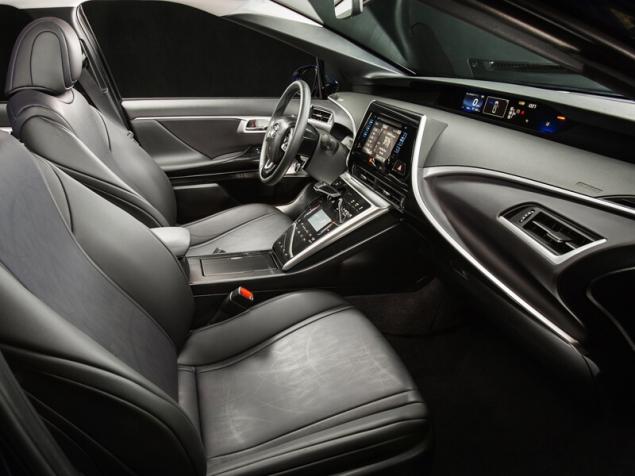
Another major Japanese automaker Honda Motor Co. next year also plans to start selling the same with Mirai by vehicle with a hydrogen engine. Nissan Motor Co. will present their model of the fuel cell after three years.
The car is endowed with the power plant TFCS (Toyota Fuel Cell System) with maximum output of 114 kW, which combines the advantages of hydrogen fuel cell and hybrid drive. The machine does not produce harmful emissions, as the only product of the TFCS is water.
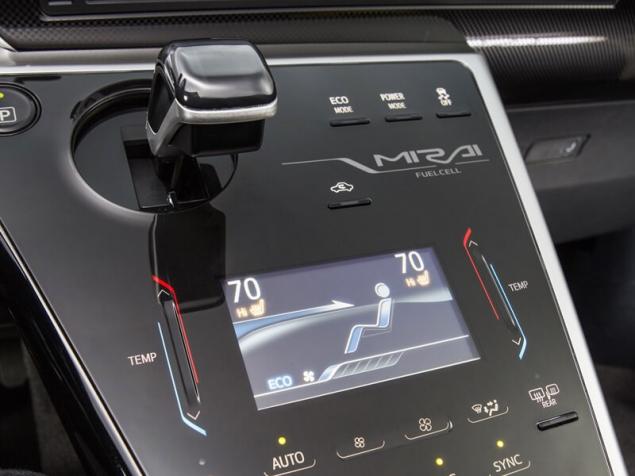
Toyota emphasizes that Mirai offers the highest level of security. So, tanks for the storage of hydrogen are produced exclusively at the company Toyota with the maximum quality control. The special structure of the tank of several layers of polymer materials and carbon fiber provides strength and the efficient energy absorption in case of deformation.
Pre-collision System (PCS) is responsible for automatic braking in case of high risk of accident. If the onboard electronics will record the fact of the accident, the supply of hydrogen from the tank will stop immediately. If necessary, will be disclosed to one or more of eight airbags.
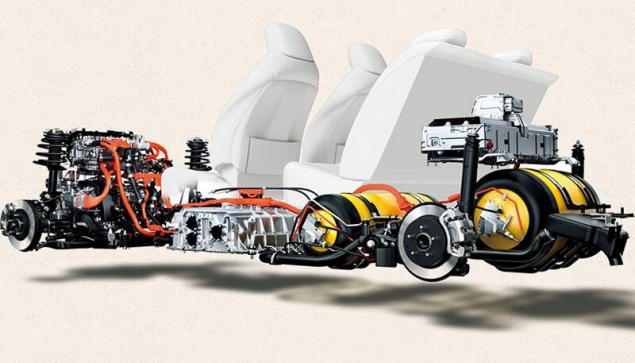
Innovative sedan has a unique design and good controllability achieved through record low centre of gravity.
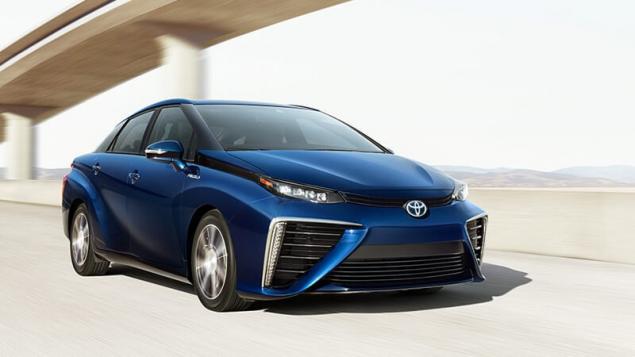
In the case of Mirai on the commercial market, Toyota President Akio Toyoda said: "We imagined a future in which mankind will use environmentally friendly cars, allowing not to rely entirely on oil reserves. It was a bold, inspirational dreams. Today they have become a reality. We are ready to produce the cars of their dreams. And the first one we called Mirai. I have seen the future. It's close by."published
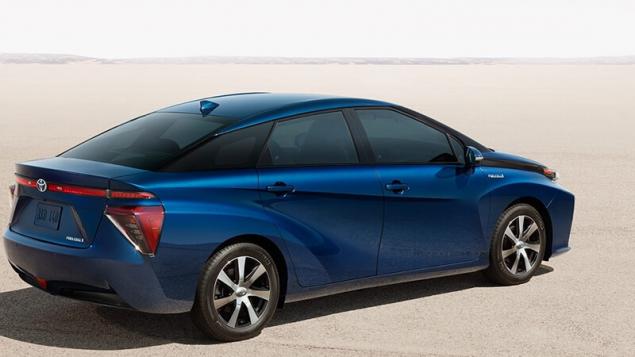
P. S. And remember, only by changing their consumption — together we change the world! ©
Source: www.3dnews.ru/917070

Due to the large interest in the new model in Japan, the number of pre-orders for Mirai has already exceeded the sales plan in the country. Until the end of last year the Japanese automaker had planned to produce 700 cars on fuel cells, in which electricity for the engine is produced by the combination of hydrogen from the tank with atmospheric oxygen. 400 of them should go to the domestic market, 200 in the US and 100 in Western Europe. In this regard, Toyota announced that until the end of 2016, is investing ¥20 billion (about $162 million) in the development of production cars with hydrogen engines, increasing production of the sedan Mirai threefold (2.1 thousand per year).
Part of the investment will focus on expanding export these machines in countries of Western Europe and the United States. They, according to Toyota, should be the main external market of hydrogen cars. By the end of 2017, the automaker intends to supply the United States for more than 3 thousand of sedan Mirai.

A significant increase in the production cars on hydrogen (up to 50 thousand per year) will be reached in 2020, when Tokyo will host the summer Olympic games. They, according to local authorities, should be a big step towards increased use of hydrogen not only in the automotive industry, but also in energy. And in 2030, every tenth sold in Japan the car will be a fuel cell that, according to the forecast of consulting company Deloitte Tohmatsu Consulting Co., bring the Japanese economy additional ¥4.4 trillion in profits (about us $36,9 billion).
The cost of the new sedan Mirai in Japan is ¥of 7.23 million ($60,7 million), while the government provides subsidies in the amount of $17 thousand each buyer of such machines in the country. In addition, holders-hour free roadside assistance, as well as an eight-year warranty for the motor and fuel cells. The only product of engine operation Mirai is water, no harmful substances are not released into the atmosphere. Tank of hydrogen fuel is enough for about 650 km, and its full filling to about three minutes.

Another major Japanese automaker Honda Motor Co. next year also plans to start selling the same with Mirai by vehicle with a hydrogen engine. Nissan Motor Co. will present their model of the fuel cell after three years.
The car is endowed with the power plant TFCS (Toyota Fuel Cell System) with maximum output of 114 kW, which combines the advantages of hydrogen fuel cell and hybrid drive. The machine does not produce harmful emissions, as the only product of the TFCS is water.

Toyota emphasizes that Mirai offers the highest level of security. So, tanks for the storage of hydrogen are produced exclusively at the company Toyota with the maximum quality control. The special structure of the tank of several layers of polymer materials and carbon fiber provides strength and the efficient energy absorption in case of deformation.
Pre-collision System (PCS) is responsible for automatic braking in case of high risk of accident. If the onboard electronics will record the fact of the accident, the supply of hydrogen from the tank will stop immediately. If necessary, will be disclosed to one or more of eight airbags.

Innovative sedan has a unique design and good controllability achieved through record low centre of gravity.

In the case of Mirai on the commercial market, Toyota President Akio Toyoda said: "We imagined a future in which mankind will use environmentally friendly cars, allowing not to rely entirely on oil reserves. It was a bold, inspirational dreams. Today they have become a reality. We are ready to produce the cars of their dreams. And the first one we called Mirai. I have seen the future. It's close by."published

P. S. And remember, only by changing their consumption — together we change the world! ©
Source: www.3dnews.ru/917070
